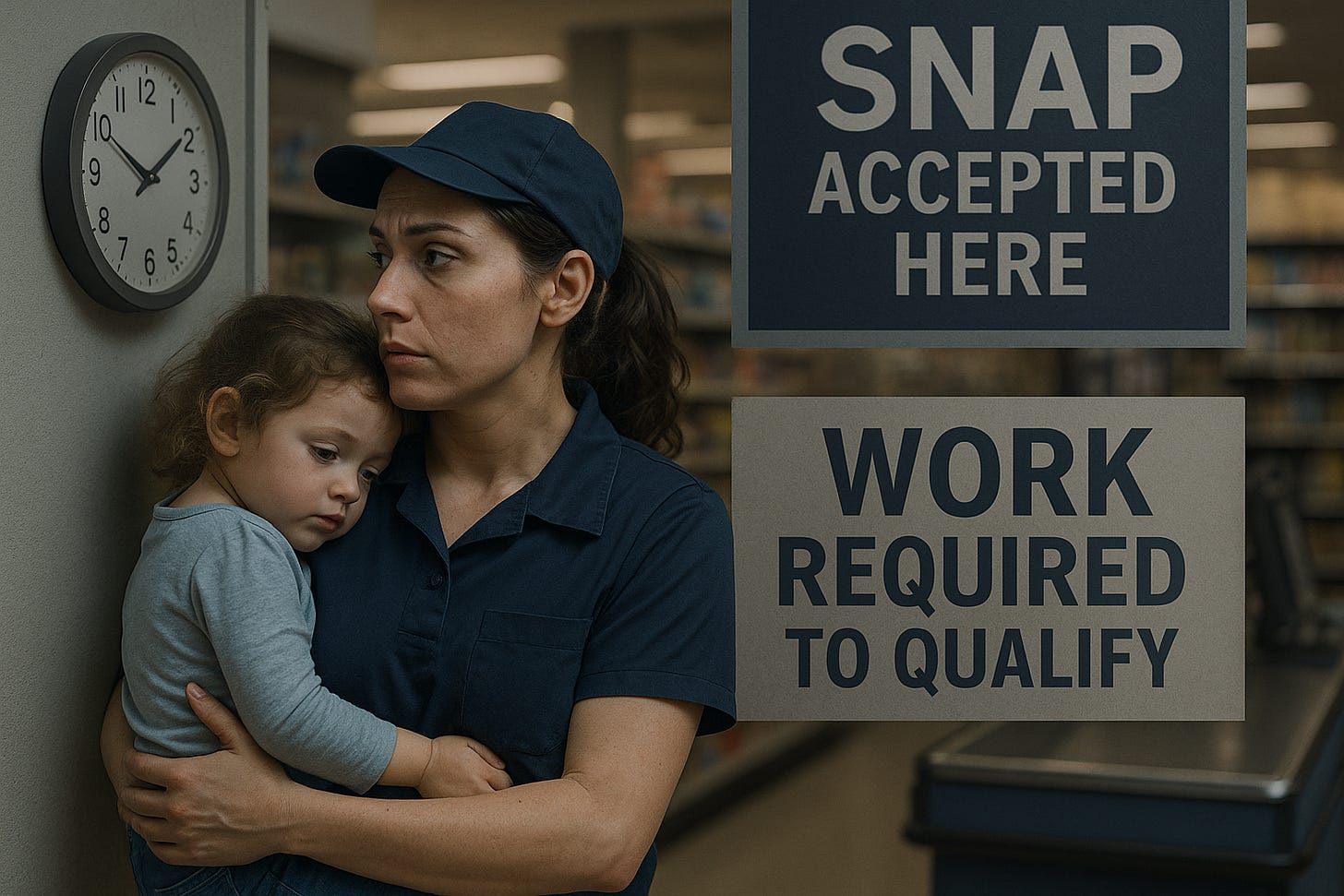GOP Targets Parents: SNAP & Medicaid Work Exemption for Caregivers Cut from 18 to 7
Another provision in the budget bill aimed at "helping" average Americans
In its sweeping new budget bill, House Republicans have advanced a quietly devastating change to the Supplemental Nutrition Assistance Program (SNAP) and Medicaid: parents and caregivers will only be exempt from work requirements if their youngest dependent child is under the age of 7. This is a drastic shift from the current standard, which exempts caregivers of children under 18.
If passed, this change will force millions of parents, especially single mothers, into workfare programs or risk losing food and health assistance, even if they have young children at home who need care and no access to affordable childcare.
We just hit 13,000 subscribers—thank you! To celebrate, we’re offering full access to The Coffman Chronicle at 50% off.
Get exclusive analysis and fearless reporting you won’t find in corporate media.
What the Change Actually Means
Under current law, adults without dependents must meet work requirements to receive SNAP or Medicaid. However, for parents and caregivers, the government recognizes that raising a child is work and thus exempts them from those requirements if they have a dependent under 18.
The House-passed bill shreds that recognition.
Now, only parents with children under 7 will qualify for an exemption. When your child enters second grade, you must meet strict work hour minimums or risk losing your benefits. No support. No flexibility. Just bureaucratic cruelty.
Real-Life Consequences for Families
The consequences will be especially severe for single-parent households, which make up a large portion of SNAP recipients. In fact, children in single-parent families account for over half of all child SNAP recipients. Many of these parents already juggle multiple jobs, irregular hours, and no childcare safety net. Imposing mandatory work requirements could mean losing access to food just because a job doesn’t offer enough hours, or they can’t find affordable care.
Advocates estimate nearly 4 million children could lose access to food assistance as a result.
Families with Children Who Need Additional Support
For families raising children with disabilities or complex medical needs, the policy is especially cruel. Even if their child is in school, they may require additional care before and after school, or may have frequent absences, therapies, or unique routines that prevent a parent from holding traditional employment. The bill makes no accommodation for this reality.
Instead, it draws a hard line: your caregiving doesn’t count unless your child meets a narrow bureaucratic definition of “disabled,” requiring full-time supervision.
A Childcare Crisis Ignored
The bill’s underlying assumption—that parents can simply go to work when their child turns 7—ignores the fact that America is in a childcare crisis:
Childcare now costs more than public college tuition in many states.
Half the country lives in “childcare deserts” with no available options.
Even when care exists, it's often unaffordable, inflexible, or full.
When the School Closes, So Does the Safety Net
Even families lucky enough to find childcare face another trap: most childcare centers operate on school schedules. That means when schools are closed for snow days, holidays, or breaks, so are their care options.
A parent with a child must either stay home or risk losing their job. They may also risk losing their SNAP benefits because the policy doesn’t make room for off days, unpredictability, or real life.
And You Can’t Send a Sick Kid to Daycare
Daycare isn’t a fallback for school closures and is definitely not an option for a sick child. Most licensed facilities will turn children away if they have a fever, cough, or other symptoms. That means the burden of care falls squarely on the parent, who is then penalized by the state for not meeting work quotas.
The Myth of the Spare Grandma
There’s an unspoken assumption in this bill that if a parent can’t care for a child at a given moment, a nearby family member will step in. But many families are geographically isolated, estranged, or just barely getting by themselves.
Worse, the same bill raises work requirements for older adults up to age 64, eliminating even more potential caregivers from the household labor pool. The grandmother who might once have stepped in is now required to log work hours herself to keep her own benefits.
This isn’t “family values.” It’s family extraction.
A Quiet Attack on the Freedom to Homeschool
There’s another, less obvious consequence of the GOP’s SNAP changes: they quietly restrict the ability of poor families to homeschool.
Under this policy, a single parent with a 7-year-old must work a certain number of hours to qualify for food assistance. That means if they want to homeschool—whether for cultural, safety, or special needs reasons—they’re faced with an impossible choice:
Work enough hours to eat, or
Stay home to teach your child and go hungry.
This effectively says: You must earn the right to raise and educate your own child at home. Wealthy families can homeschool without interference. Poor families cannot unless they forgo essential nutrition assistance.
So while Republicans often champion homeschooling as a parent’s right, this bill places that right behind an income barrier, stripping it from the very families they claim to protect.
Working for Food but Not Earning It
The most galling part? Most SNAP recipients already work. Nearly 60% of non-disabled, working-age recipients are employed, and over 75% of households with children have at least one working adult.
Many of them work for massive corporations like Walmart and Target, which don’t pay a living wage but profit handsomely when their employees spend SNAP benefits in their stores.
This bill won’t fix that imbalance. It demands more labor from people already stretched to the brink, while continuing to subsidize the companies that underpay them.
And those low-paying jobs don’t offer health insurance or other benefits.
This Isn’t About Work Ethic: It’s About Control
The GOP insists this policy “encourages work.” But in reality, it criminalizes caregiving, denies the complexity of working-class life, and treats poor parents as burdens instead of contributors.
And when those parents—especially mothers—can’t meet the arbitrary quotas, the punishment isn’t political. It’s their kids who go hungry and without care.
Advocates Sound the Alarm
Anti-hunger organizations and family advocates have condemned the provision. “This isn’t a work policy—it’s a cruelty policy,” one analyst said. “It assumes privilege, punishes need, and forces children to pay the price for poverty.”
The change is buried in the larger “One Big Beautiful Bill,” but if passed, its impacts will be immediate, widespread, and devastating.
A War on Parenthood Disguised as Fiscal Policy
This isn’t fiscal discipline. It’s a war on poor families disguised as policy. It says that unless you can prove your productivity—every hour, every day—you and your children don’t deserve to eat.
It’s not about work. It’s about erasing the humanity of poverty.
See our previous reporting on this dangerous budget bill here:
Take Action: Demand the Senate Refuse this Bill
This bill is full of harmful provisions. Here’s how to push back:
Call Your Representatives
U.S. Capitol Switchboard: (202) 224-3121
You’ll be connected to your senator or representative.
Key Talking Points:
Tell your Senator to vote NO on the budget reconciliation bill.
Demand changes be made to remove the changes to SNAP.
Insist that public safety programs be protected.
We just hit 13,000 subscribers—thank you! To celebrate, we’re offering full access to The Coffman Chronicle at 50% off.
Get exclusive analysis and fearless reporting you won’t find in corporate media.
Bibliography:
Center on Budget and Policy Priorities. “Worsening SNAP's Harsh Work Requirement Would Take Food Assistance Away.” CBPP, May 2, 2025.
Donegan, Moira. “Republicans Are Raiding Childcare Funding—to Push Women Out of the Workforce.” The Guardian, May 19, 2025.
Georgetown University Center for Children and Families. “The U.S. Already Has a Child Care Crisis: Medicaid Cuts Would Make It Much Worse.” CCF Georgetown, April 25, 2025.
“Food Stamp Reforms Could Hit Single Moms Harder Than Married Women.” Houston Chronicle, May 23, 2025.
“'Medicaid and Food Stamps Are Easy Targets': House Bill Makes Unprecedented Cuts to Medicaid and SNAP.” MarketWatch, May 23, 2025.
U.S. Department of Agriculture. “SNAP Work Requirements.” USDA Food and Nutrition Service, January 2025.
“SNAP Changes in 2025: Expanded Work Rules, New Allotments and More.” U.S. News & World Report, May 17, 2025.










Once again proving they only care about children (anyone actually) until they are born!
It‘s so sad.